- Home
- Parris Afton Bonds
Deep Purple Page 6
Deep Purple Read online
Page 6
At first the drooping mustache tickled. Then she forgot everything—the odor of aguardiente on his breath, the gravel grinding into her knees, the fact that Lawrence Davalos was five years younger than she, and most of all that he was not husband material.
The kiss was electrifying. That two people could touch in such a simple manner and detonate explosions such as ripped through her was something that had been beyond her capacity to imagine.
Law raised his head at last. His eyes were shining in the night’s darkness. “Guess I sort of forgot myself, didn’t I now?”
She cleared her throat. Was her body swaying to some inaudible music? “I think we both did,” she said in a schoolteacher’s pristine voice. “If you’ll help me rise, I’ll return to the house before it gets any later.”
When he assisted her to her feet, his hands at her arms, she considered for the first time what it really meant to have a man’s hands on her—the feeling it stirred in her, not romantic, but a purely physical, almost tangible, response.
Walking apart, they returned to the house. They made no attempt at conversation. Law, with his thumbs jammed beneath his concho belt, whistled softly that same Spanish tune she had heard earlier. He walked along the portico behind her, apparently unconcerned that his spurs clanked loudly in the stillness of the courtyard.
When she reached the door to her bedroom she did not even turn to look at him. Half afraid he might try to follow her inside the room, she quickly opened the door. “Goodnight, Law.”
“Goodnight . . . coward-Howard,” she heard him whisper as she closed the door; then came the soft whistling tune that trailed off as he made his way to his own room.
CHAPTER 8
The bell began its customary ring, signaling thirty minutes till breakfast, and still Catherine did not move from before the small mirror she had hung on the wall. The wide mouth, the hollow cheeks, eyes that were too large for the small-boned face—and the almost pointed chin her sister kindly described as oval. It certainly was not a face one would call pretty.
Yet Law Davalos had called her beautiful the night before. And he had kissed her. The kiss in itself signified nothing, for she had little doubt that he would kiss anything with a skirt on. A womanizer, her mother would no doubt call him.
But the kiss was significant in that it was her first kiss. At twenty-six, no, twenty-seven, for a birthday had come and gone in that timeless land.
And the kiss was significant, for, if Law had found her desirable, if even for a brief drunken moment, then there was hope that some other man might find her desirable also—enough to marry her. She recalled the archaeologist, Stridehope, who had stayed overnight at the Stronghold the first month she was there. He had been rather nice-looking. And once or twice she thought he glanced at her with more than passing interest. She had hoped something might come from that night. The man would have made a good husband, she believed. But he had not come again.
At breakfast she was relieved to find Law was not present. If she had seen mockery in that bronzed face, her newly found confidence in her femininity would have deserted her. Oh, she had been the recipient of admiring glances, but only in her role as the angel of mercy at the hospital—or as the lone available white woman at Cristo Rey. But the night before had been something different. Even now her lips burned from the memory of the kiss, though she told herself it was the spicy hot chocolate Loco served in place of coffee every morning.
“Oh, Miss Howard, can I?” Brigham asked.
She started, realizing she had not been listening to the conversation. She looked at Brigham now, whose blue eyes mirrored his father’s intelligence. “I’m sorry, Brigham. What was it you wanted?”
“Could I miss school today to watch the branding? Please, Miss Howard?”
She looked at Lucy, who shrugged prettily. Sherrod patted his napkin about his mouth to hide his smile, but Elizabeth said, “I don’t think the boy should, Sherrod. You don’t want him to get behind in his learning.”
“You watched the fiesta last night,” Don Francisco said. “That should be enough.”
“You can watch after lunch,” Sherrod modified.
Throughout the morning hours Catherine could sense Brigham’s discontent, for the boy’s mind was not on his spelling. And Abigail’s eyelids were having trouble keeping open—the aftereffects of the excursion the night before. When lunch was over, the girl, utterly feminine and whimsical, would have no part of watching the branding and opted for a siesta.
Sherrod was already there, directing the branding. He hoisted Brigham on his shoulders so the boy could see over the corral’s adobe wall. It could have been her son, her husband, Catherine thought. For a few happy moments she allowed herself to stand alongside Sherrod, watching the wildly thrashing animals and smelling the harsh odor of singed flesh.
But after a little while she began to feel uncomfortable under the gallant glances of the vaqueros as they one by one sensed her presence. She knew that from among the hundred or so men who worked at Cristo Rey, she could find several who would be eager to marry her. But just a glance at Cristo Rey’s ledgers told her how transient the cowboy’s life was—rarely a hand lasted through an entire year at Cristo Rey.
Extracting a promise from Sherrod that his son would return for the afternoon classes, she escaped back to the house. As she passed through the zaguan, she paused at the door of the parlor to look at the portrait of Dona Dominica. The woman and Law shared the same sun-kissed hair and golden complexion, but there the likeness ended. Her almond eyes were gentle, her mouth tender. None of Law’s fierce features were to be found in the smooth curves of her facial bones.
The woman had known the love of two men. Was she, Catherine, never to know the experience? Would she end up like Elizabeth, a withered tumbleweed?
As if bidden by Catherine’s thoughts, Elizabeth came into the room, gliding silently like some giant crow. “I was just noticing the resemblance between the mother and son,” Catherine said in an attempt at friendliness.
A facade of a smile curled the comers of Elizabeth’s lips. “The two are alike in more ways than one. The jewelry the woman wears—her son sold it. Just as she sold herself for a bed of lust!”
Catherine’s breath sucked in at the woman’s venomous words. She was relieved when Abigail’s high-pitched voice interrupted them. Limping, the girl came into the parlor, holding one stocking and her ankle-high boot in one hand. “Miss Howard, Mama says that a high arch is a sign of the genteel. Look at mine.” Abigail stuck out her small bare foot. “Do you think my arch is truly high enough?”
Elizabeth’s hand cracked across Abigail’s face. “Pride is a sin, child!”
Tears sprang to Abigail’s eyes. The sock and shoe dropped to the floor as with a small cry the girl buried her face in her hands.
Catherine was afraid if she even looked at Elizabeth, she would say something in her anger she would later repent. She gathered the sobbing girl against her, saying, "You mustn’t cry. We’ve got to go back to our studies, and you wouldn’t want Brigham to see tears in your eyes, would you?”
At least, Catherine thought, the incident kept her mind from dwelling on the night before—and Law’s kiss. She plunged into teaching the afternoon session with a forced enthusiasm she did not feel. The evening was no better. Although the rest of the household had retired, she was too agitated by the unwanted images that crowded into her mind. Foolish notions of the heart.
Of all the worthless scoundrels who walked God's green earth, Law was no doubt the worst. And she had to be attracted to him, a man five years younger. Lucy and Margaret at least had more good sense than she.
Rather than undress and toss restlessly on her bed, she lit her lamp and. with a book as a prop, wrote her first letter to her mother and Margaret. She told them about the impregnable Stronghold, the majestic landscape, and the incredibly beautiful weather. Briefly she wrote them how much better she hoped her mother was and went on to write that a sight draft would be forthc
oming and that she hoped it would be enough.
It should. She was sending more than three-quarters of her earnings. Perhaps Margaret would soon marry and help with the financial responsibility. Her sister did not like the idea of earning a living. A lady would never engage in business!
Catherine was sealing the envelope when the light knock at the door interrupted her. She hesitated, afraid it might be Law. Had the kiss he had stolen the night before made him think she was a woman of easy virtue? Was he waiting outside—expecting far more? She would certainly disillusion him!
She yanked the door open. “Well?”
Sherrod stood in the doorway, a surprised expression on his darkly handsome face. His black string tie was loosened and his vest open. "Are you in the habit of greeting people like that?” he asked with a repressed smile.
She blushed furiously. “I’m sorry, Sherrod ... my mind was on other things.”
“I was turning in, and I noticed your light. Are you all right?”
She began to roll down the sleeves of her blouse and button the cuffs. It was too late to do anything about her unbound hair. “I wasn’t sleepy and decided to catch up on some long-overdue correspondence.”
“Something I should probably have been doing instead of losing fifty dollars on a turn of cards to Law,” he said ruefully. “Perhaps I should listen more closely to Mother’s sermons about the sin of gambling.”
"Law’s back?”
"I imagine he’s over at the rancheria by now,” he said with a dry chuckle. "Well, goodnight, Catherine.”
He turned to go and abruptly turned back, as if an afterthought had occurred. "You know. I’m not sleepy either. What do you say to a breath of fresh air? June nights are the best of the year.”
She hesitated. Then, “Why not? Just let me pin up my hair, and I’ll—”
“No, leave it down. It’s very—” He broke off, and she knew that it had only just occurred to him that what he intended to say was highly improper. A man might tell his mother or a sister or his wife that her hair was very becoming left unbound, but never a single female; never could such a thing be said to Catherine Howard.
She made no reply but shut the door behind her and walked with him through the darkened courtyard and zaguan. Out in the compound they found a bench, worn smooth with the years. Sherrod, sitting a little apart from her, talked quietly of his plans for Cristo Rey.
“I realize the Stronghold has come a long way from the simple stucco rancho that Law and his mother lived in when we arrived in the territory, but there’s so much more to be accomplished. I want to irrigate Cristo Rey’s desert area and breed a better strain of cow to improve our herds. But that must wait until the Indian problem is settled. And then there’s the house itself—wallpaper, glass windows, things that would make Lucy happy.”
Catherine saw the flicker of concern darken the thick-lashed eyes. “Lucy speaks often of how much she misses Virginia.”
He hunched forward, his hands clasped between his knees. “Lucy came west with her parents when President Pierce appointed her father territorial attorney for New Mexico. Father and I had gone to Santa Fe because we were having trouble confirming Dona Dominica’s land grant, and I met Lucy at one of the dinners given by the governor.
“Naturally, I fell in love with her immediately. But with Tucson five hundred miles from Santa Fe, I despaired of being able to court her. Fortunately, I was able to persuade her to accept my proposal immediately.”
Sherrod’s interlocked fingers came up to rub absently against his mustache. Catherine thought he was finished speaking, but after a moment, he continued. “I know that life out here has been difficult for Lucy to adjust to. Even Santa Fe had more cultural activities for her than this—” His hand swept the darkened panorama. “That’s why I'm so relieved my father found someone as educated as you—and so glad you were willing to come out here. You see, Lucy—well, I guess you can tell by now—Lucy’s not happy here at Cristo Rey.”
“I gathered that.”
“Yes, I’m sure it’s obvious. She needs to get away, but I simply can’t leave right now. I thought next year, when the children go off to boarding school. Perhaps she could spend a year back East with her family.”
Catherine wanted to tell him it would all work out. But she was not certain it would. She said instead, “Tell me, what was it like growing up with two mothers?”
Sherrod looked at her and smiled. “It was marvelous. Can you imagine being spoiled by not one but two mothers?”
She knew herself how difficult it was for two women to live in the same household, even when they loved each other dearly. But two wives, competing for the same man ... it was beyond her comprehension. “Surely the two wives must have had problems with the—I suppose you would call it their bounds of authority.”
“Not really. Mother is a very organized, practical woman. She dealt with the running of the household. And Dona Dominica was a very maternal woman. She saw to the raising of Law and myself. I came to love her as much as my own mother—and Law as I would my own brother, though I don’t think I’ll ever understand his indifference to Cristo Rey.”
Catherine opened her mouth to speak, and Sherrod, laughing, held up a hand. “Don’t ask me whose area of authority my father fell under, because I was too young at the time to give much thought to things like that. And when I was old enough to wonder, Dona Dominica died—from some female disorder.
“But enough of the Godwins,” he said. “Tell me something of yourself, Catherine.”
“I would like to be able to tell you something exciting.” She smiled, certain that in the shadows he could not see the wryness that curved her lips. “Such as that I’m a Russian princess fleeing persecution. But the simple fact is that between my father, who was a schoolmaster, and the Excelsior Finishing School for Young Women, I received an excellent education. Some time ago my mother became ill, and between caring for her and my younger sister and working at the local hospital, too many years have slipped away.”
“But what brought you out here?”
“The search for excitement, I suppose.”
A muscle twitched in his jaw. “And Lucy wants the East, where she thinks all the excitement is! I keep telling her that everything worthwhile is here—at Cristo Rey.”
Catherine sighed. “At this moment the East is filled with destruction and death. There is nothing beautiful about the pall of smoke that hangs over the cities. There are no glorious sunrises or sunsets like what I see above the Whetstones when I wake or the Santa Ritas before I go to bed.”
“Why can’t Lucy understand that?” he asked tersely. “Why can’t she love the beauty of Cristo Rey as you do? I thought she—”
He broke off, and Catherine sensed the embarrassment in his voice. “I don’t know why I’m telling you all of this.”
She shifted uneasily on the wooden seat. The moon had moved past the Stronghold’s earthen roof so that the compound lay in total shadow. But she had the strangest feeling of being watched.
“Catherine,” Sherrod said softly, “thank you for listening to me tonight. I needed to talk.” He paused. “I value your friendship very much.”
She was not even aware of the hand that took hers or the way his arm encircled her waist when they returned to their separate rooms. Her thoughts were still back at the compound remembering the tiny spark of light she had seen in the distant shadows . . . and the noxious odor of Sonoran tobacco that had drifted on the air.
CHAPTER 9
Through the escape of her daily riding, Catherine was beginning to know the countryside. The twisted mesquite grove that heralded Coyote Wash—an arroyo that would run rabid with flash floods in the monsoon months; the red sandstone boulders that indicated the trickle of water seeping at their base; and the miniature canyons that opened fold on fold, like a desert flower, ever exposing some exotic landscape to delight her aesthetic taste. For her the land possessed incredible lights and shades . . . intensely sharp colors not to be s
een anywhere else.
But now the July heat stole a little of the pleasure from riding. The parched land was a fiery furnace. Blue-green mirages shimmered against the horizon. Life itself seemed stilled, the wind wilting, waiting for those first fleecy clouds to mantle the brooding bulwark of the Huachucas. Still, she loved it, despite the perspiration that soaked her armpits and dampened her thighs where they rubbed against the sidesaddle’s sweaty leather. The blistering summer played its part in the Southwest’s timeless magic show.
It was these hours she lived for. She cared not where the mount took her and was only half aware of the trail it followed as it picked its way along a rocky bed bordered by the waxy- leafed creosote and the green-barked paloverde. But when it halted suddenly, its small ears erect and the muscles in its barrel twitching, she came alert. Something out of the ordinary moved beyond the range of her own senses. She did not know which she feared worse—the screech of the Mexican jaguar that occasionally roamed the area or the sight of a string of Indians riding toward her.
The long seconds she sat on the roan, straining her eyes and ears, seemed more like minutes. She began to believe she was attributing more caution than the situation warranted when a voice behind and slightly above her said, “Aren't you a little far from the Stronghold, Miss Howard?”
She jerked around in the saddle. “Law!” she gasped, recognizing at once the man crouched on one knee on the bank’s high rim. Above the black, dust-coated trousers his lean, brown body was bare. “I’m so glad it’s you!”
“Oh?” He rose now and scrambled down between a wedge of rocks, crossing to catch the bridle of the roan, which danced nervously at his approach. He stroked the soft muzzle, and when the horse calmed, looked up at Catherine. “I had an idea you might be happier to see someone else.”
She tensed. She forced her gaze to meet those watchful eyes. "Whatever are you talking about?”
His mouth stretched thin in a grimace. “Don't pull one of Lucy’s simpering acts on me, Miss Howard. I thought you were above something like that.”

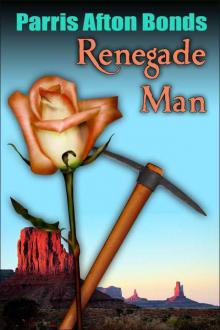 Renegade Man
Renegade Man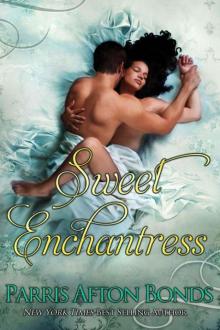 Sweet Enchantress
Sweet Enchantress Savage Enchantment
Savage Enchantment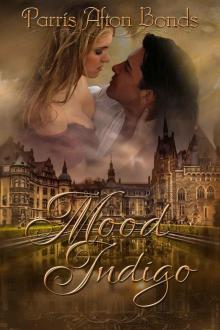 Mood Indigo
Mood Indigo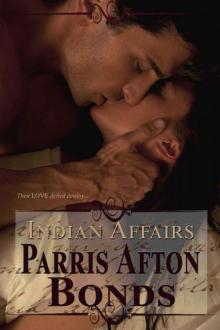 Indian Affairs (historical romance)
Indian Affairs (historical romance)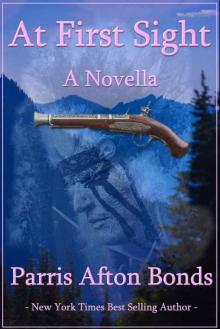 AT FIRST SIGHT: A Novella
AT FIRST SIGHT: A Novella The Maidenhead
The Maidenhead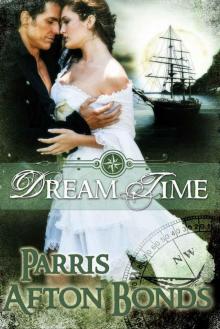 Dream Time (historical): Book I
Dream Time (historical): Book I Made For Each Other
Made For Each Other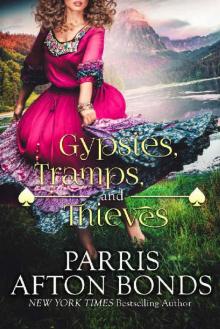 GYPSIES, TRAMPS, AND THIEVES
GYPSIES, TRAMPS, AND THIEVES Deep Purple
Deep Purple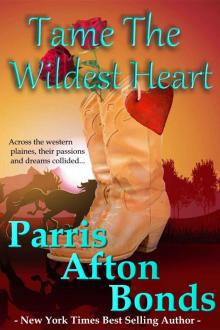 Tame the Wildest Heart
Tame the Wildest Heart LAVENDER BLUE (historical romance)
LAVENDER BLUE (historical romance)